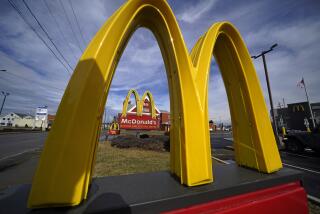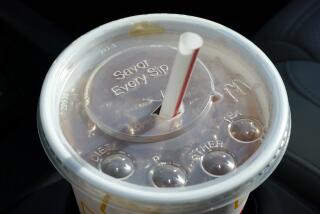Pickles, No Antibiotics
- Share via
McDonald’s, chased by you-made-me-fat lawsuits and animal-rights protesters, has responded with a very good deed. It is ordering its main meat suppliers to phase out the use of antibiotics by 2004.
The fast-food chain, one of the biggest U.S. purchasers of meat, may be triggering an end to the era of dangerous overuse of antibiotics.
The livestock industry began using the drugs in the 1950s and soon became addicted. Antibiotics help fatten animals for slaughter and compensate for the crowded conditions on farms that are breeding grounds for disease.
Today, 70% of all antibiotics consumed in the United States are mixed without a prescription into farm animal feed, according to the Union of Concerned Scientists. That amounts to 24 million pounds a year and a tidy profit for drug companies. But scientists warn that dosing animals with antibiotics to accelerate weight gain has had two bad effects:
* When humans eat animals that have been regularly fed antibiotics, bacteria in the humans tend over time to develop immunity to the antibiotics. This forces doctors to prescribe larger doses of antibiotics to cure bacterial diseases.
* Even more worrying, livestock that has been bulked up with antibiotics can transmit antibiotic-resistant forms of infections such as salmonella to humans.
Antibiotics wipe out most of their target bacteria on first use, but the few that survive begin an evolutionary process toward drug resistance. They may become more virulent in the process.
The medical journal Clinical Infectious Diseases has concluded that agricultural use of antibiotics “increases the number, severity and duration of infections.”
McDonald’s, which worked closely with the nonprofit group Environmental Defense and other advocacy organizations over the last year on cutting out antibiotics, is right to insist that farmers end a practice that harms animals and humans. With its 30,000 restaurants in 118 countries, the chain has real leverage in the livestock industry.
If consumers respond favorably, the rest of the fast-food industry will no doubt follow. At that point, the effect would be similar to what happened in the auto industry when California demanded tailpipe air-quality standards. If you’re going to make it one way for such a big consumer group, you might as well make it that way for everyone.
Obviously, there’s grand publicity value in the McDonald’s action, giving the corporation’s image a quick green sheen and taking the focus off the fat and salt content of its fare. But the praise for quitting meat antibiotics is entirely deserved.
More to Read
Inside the business of entertainment
The Wide Shot brings you news, analysis and insights on everything from streaming wars to production — and what it all means for the future.
You may occasionally receive promotional content from the Los Angeles Times.









